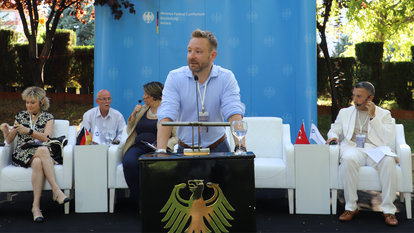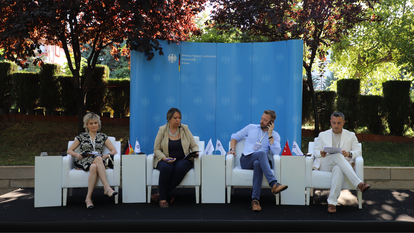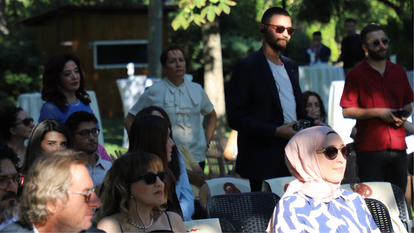Constitutional Rights
Through the Lens of Freedom: Constitutional Rights in a Changing World

The Embassy of the Federal Republic of Germany, the Friedrich Naumann Foundation for Freedom's Türkiye Office and the Human Rights Academy successfully organized this year's traditional competition of artificial intelligence and photo-type visuals. This competition, which deals with the current situation of constitutional rights, attracted great interest and 13 works were selected by the jury from over 200 entries to be exhibited.
Prior to the exhibition, a panel discussion was organised at the Embassy of the Federal Republic of Germany in Ankara to shed light on the current state of constitutional freedoms under changing conditions. The event titled "Through the Lens of Freedom: Constitutional Rights in a Changing World" addressed the importance and current position of constitutional rights under changing conditions at the local and global level.
The program started with the opening speech of Henning Simon, Envoy of the Embassy of Germany in Ankara. On the occasion of the 75th anniversary of the German Constitution, Mr Simon spoke about the importance of protecting the fundamental rights and freedoms guaranteed by constitutions.
Mr Simon's speech was followed by remarks by Beate Apelt, Permanent Representative of the Friedrich Naumann Foundation for Freedom Türkiye, and Elif Menderes, founder of the Human Rights Academy. They spoke about the importance of the German Constitution's infrastructure for protecting human dignity, freedom and fundamental rights, how and to what extent these values are under threat today, and the role of the event in highlighting these themes.

Afterwards, Professor Dr Alexander Thiele from the BSP Faculty of Business and Law delivered his speech titled "The Importance of Fundamental Rights in Germany". Thiele gave valuable information on the contributions of the rights and freedom-oriented constitution, which is built on the civil consciousness in Germany, to the understanding of a state that serves individuals.
The discussion part of the panel was moderated by Zeynep Gürcanlı with the participation of Prof. Dr. Alexander Thiele, Prof. Dr. Selin Esen from Ankara University and Dr. Volkan Aslan from Istanbul University. In this section, the focus was on the protection of fundamental rights in constitutions and the relationship between developments in the country and the constitutional context, and the topics covered were expanded to include local agendas.
The experts discussed the protection of fundamental rights in constitutions and the relation of developments in Türkiye to the constitutional and fundamental rights contexts. The importance of the constitutional coverage of fundamental rights for their protection and the effectiveness of the forms of these constitutional arrangements in protecting these rights were also discussed. New areas emerging in a changing world and new rights arising from these new areas were also among the topics explained by the experts of the subject.

In the discussion, the expansion of the subject of fundamental rights beyond humans to the environment and animals and related developments were also discussed. Prof. Dr. Volkan Aslan gave the Ecuadorian Constitution as an example of the implementation of the expanded scope of rights and referred to the issue by saying that "it is possible for human beings to live in dignity by keeping their surroundings alive in dignity".
The panel ended with a question and answer session that allowed participants to further explore the intricacies of the topic and exchange views. This session gave the participants the opportunity to find answers to their questions and get expert opinions on the subject. Following the panel discussion, a reception was organised to showcase the winners of the competition. Participants had the opportunity to chat with the authors about the context of constitutional rights in a changing world.

The exhibition offered participants the opportunity to experience the intersection of artistic production and constitutional rights. The works conveyed strong messages about the challenges facing constitutional rights in today's world. Participants interacted one-on-one with the artists and learnt about the creative process and the themes of the works. The artists had the opportunity to explain the inspiration behind their works and the significance of their works in the context of the protection of constitutional rights and human rights. In addition, the participants had the opportunity to share their own perspectives and experiences on the themes of the works and to shape them from different perspectives.